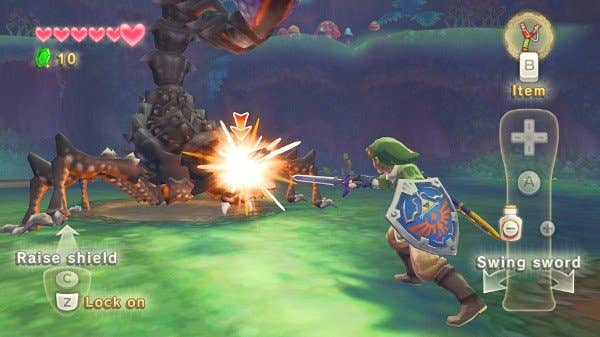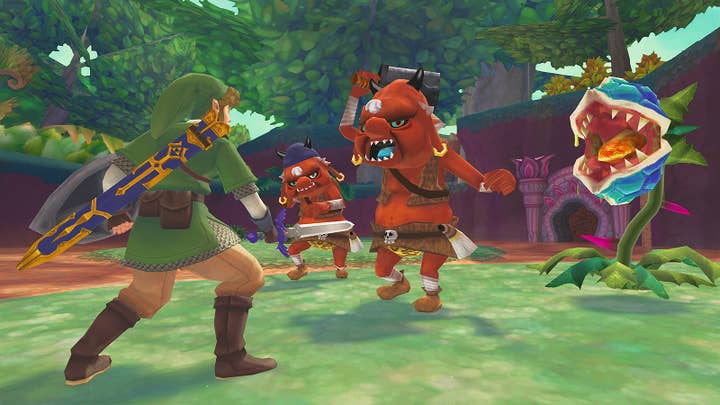Critical Consensus: The Legend of Zelda: Skyward Sword
Nostalgia is a dubious premise on which to base a review. For critics to adequately perform their duties, particularly if they are required to conclude their assessment with an arbitrary number or star rating, a removal of some portion of the self is required. Playing a game may be a subjective experience, but that rating implies an objective standard. The skilled critic understands how to maintain a balance between the two, but in this area nostalgia is the enemy of good judgement.
Mark Twain called nostalgia "mental and moral masturbation," and he's probably right. But while it may seem foolhardy to contradict so fertile a mind, it's worth pointing out that Mr. Twain never had to review a Zelda game.
Select any five Zelda review from the stockpile of links on Metacritic and you will be faced with five opening salvos waxing lyrical about historic adventures, the re-telling of tales, and stories passed from generation to generation. This is multi-purpose purple prose: at once a crash-course in the critic's fondness for the series, a reminder that Zelda games are built around the same basic template, and an explanation for why this formulaic tendency, so abhorred in other games, is to be celebrated when applied to Link, Zelda and Hyrule.
"For all their epic sweep, they are more rituals than stories," writes Eurogamer's Oli Welsh in his 10 out of 10 review. "If the Super Mario games are all about breaking the rules, Nintendo's other great series is about observing them: players and game designers alike following intricate pathways of logic to their roundly satisfying conclusions."
"Zelda games are never without mystery or surprise, but they are always the same, and for those who've lived with them for even half their quarter century, they're getting pretty familiar."
However, while the standard Zelda template is once again present and correct, Nintendo has once again managed to balance the familiarity with fresh ideas and ingenious design.
This is apparent from Skyward Sword's bright, polished surface. It is, Welsh writes, "an unabashedly youthful and romantic game that bursts with colour, comedy, sentiment and flippant joy. This year's Link may be the rangy teenager model rather than the cute moppet, but the world around him is very much the breezy, bustling cartoon of Wind Waker and the DS games."

"The sombre tone of Twilight Princess is swept aside and the ghost of Ocarina is, at long last, laid to rest. This one's quite rightly for the kids - in all of us."
More than any other Zelda game in memory, Skyward Sword is in no rush to get the action started. Welsh calls the story-driven introductory sequence "delightfully unforced", as Nintendo established the world of Skyloft, its idiosyncratic denizens, and, most importantly, the relationship between Zelda and Link.
"For the first part of the game you're not trying to rescue her from some distant threat, you're just desperately trying to be reunited with Zelda, tracking her across the weird and impenetrable world below. Skyward Sword is more explicitly a love story than any Zelda before it - more than most video games dare to be, in fact."
The Daily Telegraph's Tom Hoggins is similarly besotted with Link's return to the Wii, framing Skyward Sword as not just a swansong for Nintendo's console, but the most complete realisation of the console's potential. The key is motion control, which, with the help of Wii Motion-Plus, functions just as you would expect, and just as no previous Wii game managed to achieve.
"It starts with that sword, of course - a Motion-Plus enhanced slice of genius," Hoggins writes in his five-star review. "Nintendo's underused add-on justifies its own existence in a swipe, Link's sword hand mirroring your own as you move through the world. In combat, Nintendo finds a balance between 1:1 showmanship and controlled, disciplined strikes, translating your remote swing with surgical precision: horizontal, vertical and diagonal."
"There's plenty of room for expression, circling your sword while waiting for an opening, or letting it dangle nonchalantly by your side before sweeping in for the kill. In and of itself, the swordplay is tremendous, forging a connection between player and avatar that motion control has failed to do thus far."
Nintendo's underused add-on justifies its own existence in a swipe, Link's sword hand mirroring your own as you move through the world
Tom Hoggins, The Daily Telegraph
This extends to Link's other equipment and gadgets, from his accurate and smoothly responsive slingshot to bombs that are deployed like Wii Sports' bowling balls. Joystiq's Griffin McIlroy sees the refinement applied to the motion controls in all aspects of the game's design, injecting a sense of life into the series' hoariest traditions.
"Though the order of the dungeons hasn't changed, their content has been largely refocused on puzzles rather than exploration," he writes in his 9 out of 10 review. "I would go into a room and be greeted by a clever, oftentimes devious puzzle to be solved. This ethos is by no means new, but it's never been as refined as it is in Skyward Sword -- as a franchise-long veteran, I wasn't anticipating how long some of these temples took me to solve."
"Refined" is an apt descriptor of the whole experience; many of the constituent, familiar elements which compose Skyward Sword are the best the series has ever seen. Its temples are the smartest. Its boss fights are the most satisfying. Its characters are the most endearing, and the best-written, to boot. Its fully orchestrated and expansive musical score is by far the greatest accompaniment in the franchise's history, and as a result, possibly the best video game soundtrack of all time."
However, there's enough of a gap between McIlroy's 9 and Eurogamer and The Telegraph's 10s to pay lip-service to a handful of flaws. At its best, Skyward Sword elicits feelings of "genuine exhilaration", but McIlroy laments Nintendo's tendency to interrupt the game's flow with "filler".
"It's so rare that a game can be added to by subtraction, but some of the biggest offenders in Skyward Sword simply have no reason to exist. The fetch quest which has you re-traverse the majority of a completed dungeon to secure an item from the final room? The third time you have to beat the same boss, with a few minor changes between each encounter? I cannot believe sequences like these appear in a game with such unsurpassed polish."

There is one person who might agree with McIlroy: Giant Bomb's Patrick Klepek, one of the brave few to give Skyward Sword a four-star, or 8 out of 10, review. Klepek is as positive as his score would suggest, but he sees systems like potion-crafting and item-upgrading as cursory nods towards depth that the challenge presented by the game simply doesn't require.
The series' longstanding template aside, Zelda is also beginning to show its age in other ways. "It's unacceptable now that Link doesn't have access to any catch-all quest log," Klepek offers. "Sure, the replacement for Navi, the robotic Fi, will provide you hints on where to go next, but that only relates to the primary goal, and she does not keep a database of side quests stumbled upon while exploring Skyloft."
"Characters have conversation icons above their heads if they have anything to say, but it's contingent upon you to either resolve a side quest when you encounter it, or make a note of and come back. Mostly, I just never came back."
And then there's the stately opening section, which Eurogamer's Oli Welsh described as "delightfully unforced. Apparently, other opinions are available, and Klepek has a rather different take.
"Skyward Sword doesn't do itself any favours in taking its sweet time getting started, and longer before introducing you to some of its most creative highlights. Designer Shigeru Miyamoto once said 'the first 30 minutes of a game is the most important,' and Skyward Sword fails to pass that test."
Ultimately, while Skyward Sword is a "very good Zelda game and a rather great adventure game," Klepek feels that the series is in the midst of an identity crisis, trading on its past glories even as it struggles to escape their shadow, caught between honouring tradition and the need to recognise evolutions in RPG design.
"Zelda doesn't need to become something else to maintain relevance, but at a certain point, when 'a brand-new great Zelda game' isn't enough, there's reason to pause."
